The costs associated with equipping a contractor fleet to offer a full-baled silage service that includes mowing, tedding, baling, wrapping and transporting bales have now become expensive. This is why tooling up for baled silage should no longer be considered to be the cheaper option.
Combination baler and wrapper units have become very popular in Ireland as skilled operators have become scarce, but they may not be for everyone and for every field condition.
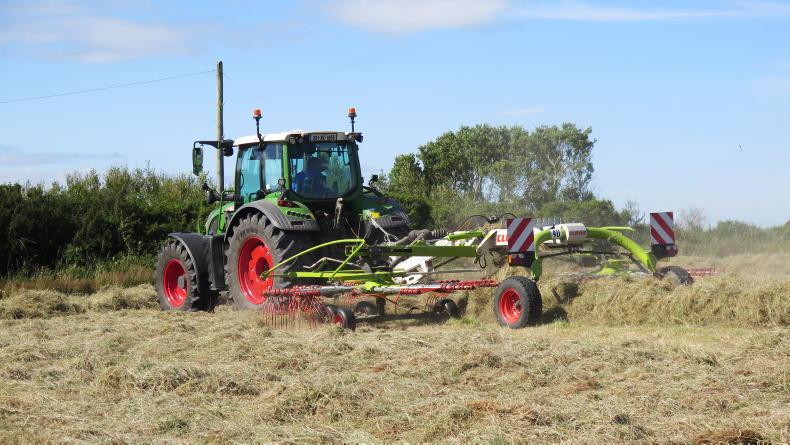
Clean mowing and good raking are important in the delivery of good-quality bales.
This year, many farmers are being advised to cut and bale paddocks that have not been grazed because of the poor ground conditions.
Some of these fields may be only marginally suitable for machinery traffic, so the use of heavier combination machines may be restricted.
To offer the kind of full service that modern farmers require will demand investment in mowers, rakes, balers or combination units, perhaps a wrapper and some bale handling machinery including loaders and purpose-built trailers.
That’s an expensive shopping list and that’s also before we consider the tractor fleet.
So, let’s take a closer look at the tooling up costs.
Tractor operating costs have been well examined and now come in at more than €55 per hour, with an operator cost included.
This year, additional costs associated with higher labour taxes, including pension requirements, have pushed labour costs for contractors to well in excess of €25 per hour, if the operator is be paid €15 per hour after tax.
Baler and combination units
Baler and combination unit costs have been a noticeable part of machinery cost inflation.
Combination units, the preferred choice of many contractors, are available from a number of brands.
Irrespective of the brand, the entry prices are in excess of €100,000.
With such a pool of machines in the market, the replacement cost is a critical factor for many contractors.
Replacement prices are often based on the bale count on the machine. We are hearing figures as high as €1.50 per bale as a replacement cost.
In the hands of a contractor, the combination unit will be expected to bale in excess of 15,000 bales per season in order to justify its keep.
That equates to a replacement or depreciation cost for the combination baler of more than €20,000 after just one season of work.
Baled silage costs: from mowing to baling
When we examine the overall baled silage costs to the farmer, we need to look at mowing and raking to begin with.
Some farmers will do this part of the job and, in a year like this one, their services will be called on to help the contractor to get through the work.
Where farmers request that the grass is not cut before 12 noon, this means the working day for the mowing outfit is half that of the rest of the contractor’s team. Achieving the necessary mowing output in half days to match the full day baler capacity now often demands two or three mowing outfits.
Mowing costs for 2024 will be in the region of €29/ac to €30/ac (including VAT at 13.5%).
Tedding and raking will add another €17/ac to €18/ac (including VAT at 13.5%). So, we have a charge of €46/ac to €48/ac before the baler ever arrives at the field.
Clean mowing and good raking are important in the delivery of good-quality bales that have good weight and will wrap properly, ensuring good preservation.
The width and presentation of the swathe of grass, with minimal lumps, ahead of the baler, will determine the output of the machine and also the quality of the work.
Typical recommendations for grass moistures at baling is 35% to 45% dry matter which is drier than those for precision-chopped silages. That’s why many contractors prefer to offer a full service where they can control the quality of the work from the mowing onwards. Ideally, grass should be baled within 48 hours of cutting.
An 8t/ac crop will produce 16 bales to the acre. Early first cuts in paddocks will not achieve that level of crop yield; between 12 and 14 bales per acre would probably be more realistic and some will be lower.
Plastic prices are always difficult to estimate right up until the week before baling begins
Baling on its own, without wrapping, will cost €9/bale to €10/bale, while the combination baler cost with be €16/bale to €18/bale with plastic, or €12/bale to €14/bale without plastic.
Plastic prices are always difficult to estimate right up until the week before baling begins, so these are estimates.
At 12 bales per acre, the total cost per bale before the baler arrives could be in the region of €4 to €5 per bale.
Add the baler costs and the figure comes to close to between €20/bale and €23/bale (including VAT at 13.5%). Where the contractor is stacking the bales or transporting and stacking them, there are hourly rates and cost-per-bale rates.
A high-performance combination baler will bale and wrap up to 25 bales per hour in good conditions. That’s going to be equivalent to about three acres of paddocks per hour for that side of the job.
Where the yield is low, and grass from a patchwork of paddocks is being baled, the baling capacity of that machine will be restricted before moving on to the next farm.
The contractor is then tooling up for relatively smaller jobs, especially where the farmer does the mowing and tedding ahead.
In this situation, the contractor is bringing in a combination baler (€100,000) and a 150hp+ tractor (€150,000) for what could be a 20-bale job. And then move on.
Some contractors are aware of this high cost versus poor return on investment and have considered applying a fair callout charge for these specific applications.
Six layers of film cover are recommended for higher dry matter silage and longer-term storage for sheep
This will be especially necessary in a year such as this, where paddock growth has gone ahead on almost every dairy farm, and these will need to be baled early in May. But bale numbers might be low, so the cost of multiple smaller jobs will impact on the profitability of the contractor’s operations.
The standard wrapping procedure in Ireland is typically four layers of 25-micron black film applied with 70% stretch level, with some individuals choosing to move to six layers.
A 750mm x 1,500m film roll of silage wrap should typically cover from 28 to 32 bales per roll, based on four layers per bales.
Six layers of film cover are recommended for higher dry matter silage and longer-term storage for sheep.
Bale transport distance is also a cost factor. Transporting bales over long distances demands good equipment or large supplies of fixing tape and time.
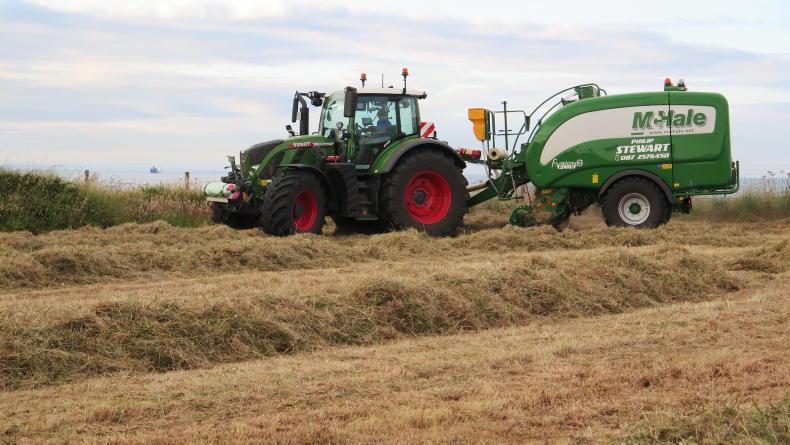
Tooling up for baled silage operation now requires considerable investment in machinery to achieve high output levels.
Bales should be moved to their storage area within hours of being wrapped to minimise the risks of transport damage to what is now an expensive crop to harvest.
Skilled operator
Modern bale handling machines in the hands of a skilled operator will deliver good-quality bales to the storage area with minimal damage. Hourly rates of between €85/hour and €90/hour or €5/bale to €6/bale are needed to cover the costs of good equipment and skilled operators.
To achieve the high output levels needed to meet the finance and operational costs demands of a modern baled silage outfit, the contractor needs an adequate return on the significant investment. The early crops from ungrazed paddocks may have critical time demands to ensure quality, while the costs of low return crops with low bale counts must meet the financial needs of the contractor and be charged accordingly.
Bale when grass dry matter gets to 35%.Ideally, bale within 48 hours of moving.Bale costs in 2024 could run up to €24/bale.
The costs associated with equipping a contractor fleet to offer a full-baled silage service that includes mowing, tedding, baling, wrapping and transporting bales have now become expensive. This is why tooling up for baled silage should no longer be considered to be the cheaper option.
Combination baler and wrapper units have become very popular in Ireland as skilled operators have become scarce, but they may not be for everyone and for every field condition.

Clean mowing and good raking are important in the delivery of good-quality bales.
This year, many farmers are being advised to cut and bale paddocks that have not been grazed because of the poor ground conditions.
Some of these fields may be only marginally suitable for machinery traffic, so the use of heavier combination machines may be restricted.
To offer the kind of full service that modern farmers require will demand investment in mowers, rakes, balers or combination units, perhaps a wrapper and some bale handling machinery including loaders and purpose-built trailers.
That’s an expensive shopping list and that’s also before we consider the tractor fleet.
So, let’s take a closer look at the tooling up costs.
Tractor operating costs have been well examined and now come in at more than €55 per hour, with an operator cost included.
This year, additional costs associated with higher labour taxes, including pension requirements, have pushed labour costs for contractors to well in excess of €25 per hour, if the operator is be paid €15 per hour after tax.
Baler and combination units
Baler and combination unit costs have been a noticeable part of machinery cost inflation.
Combination units, the preferred choice of many contractors, are available from a number of brands.
Irrespective of the brand, the entry prices are in excess of €100,000.
With such a pool of machines in the market, the replacement cost is a critical factor for many contractors.
Replacement prices are often based on the bale count on the machine. We are hearing figures as high as €1.50 per bale as a replacement cost.
In the hands of a contractor, the combination unit will be expected to bale in excess of 15,000 bales per season in order to justify its keep.
That equates to a replacement or depreciation cost for the combination baler of more than €20,000 after just one season of work.
Baled silage costs: from mowing to baling
When we examine the overall baled silage costs to the farmer, we need to look at mowing and raking to begin with.
Some farmers will do this part of the job and, in a year like this one, their services will be called on to help the contractor to get through the work.
Where farmers request that the grass is not cut before 12 noon, this means the working day for the mowing outfit is half that of the rest of the contractor’s team. Achieving the necessary mowing output in half days to match the full day baler capacity now often demands two or three mowing outfits.
Mowing costs for 2024 will be in the region of €29/ac to €30/ac (including VAT at 13.5%).
Tedding and raking will add another €17/ac to €18/ac (including VAT at 13.5%). So, we have a charge of €46/ac to €48/ac before the baler ever arrives at the field.
Clean mowing and good raking are important in the delivery of good-quality bales that have good weight and will wrap properly, ensuring good preservation.
The width and presentation of the swathe of grass, with minimal lumps, ahead of the baler, will determine the output of the machine and also the quality of the work.
Typical recommendations for grass moistures at baling is 35% to 45% dry matter which is drier than those for precision-chopped silages. That’s why many contractors prefer to offer a full service where they can control the quality of the work from the mowing onwards. Ideally, grass should be baled within 48 hours of cutting.
An 8t/ac crop will produce 16 bales to the acre. Early first cuts in paddocks will not achieve that level of crop yield; between 12 and 14 bales per acre would probably be more realistic and some will be lower.
Plastic prices are always difficult to estimate right up until the week before baling begins
Baling on its own, without wrapping, will cost €9/bale to €10/bale, while the combination baler cost with be €16/bale to €18/bale with plastic, or €12/bale to €14/bale without plastic.
Plastic prices are always difficult to estimate right up until the week before baling begins, so these are estimates.
At 12 bales per acre, the total cost per bale before the baler arrives could be in the region of €4 to €5 per bale.
Add the baler costs and the figure comes to close to between €20/bale and €23/bale (including VAT at 13.5%). Where the contractor is stacking the bales or transporting and stacking them, there are hourly rates and cost-per-bale rates.
A high-performance combination baler will bale and wrap up to 25 bales per hour in good conditions. That’s going to be equivalent to about three acres of paddocks per hour for that side of the job.
Where the yield is low, and grass from a patchwork of paddocks is being baled, the baling capacity of that machine will be restricted before moving on to the next farm.
The contractor is then tooling up for relatively smaller jobs, especially where the farmer does the mowing and tedding ahead.
In this situation, the contractor is bringing in a combination baler (€100,000) and a 150hp+ tractor (€150,000) for what could be a 20-bale job. And then move on.
Some contractors are aware of this high cost versus poor return on investment and have considered applying a fair callout charge for these specific applications.
Six layers of film cover are recommended for higher dry matter silage and longer-term storage for sheep
This will be especially necessary in a year such as this, where paddock growth has gone ahead on almost every dairy farm, and these will need to be baled early in May. But bale numbers might be low, so the cost of multiple smaller jobs will impact on the profitability of the contractor’s operations.
The standard wrapping procedure in Ireland is typically four layers of 25-micron black film applied with 70% stretch level, with some individuals choosing to move to six layers.
A 750mm x 1,500m film roll of silage wrap should typically cover from 28 to 32 bales per roll, based on four layers per bales.
Six layers of film cover are recommended for higher dry matter silage and longer-term storage for sheep.
Bale transport distance is also a cost factor. Transporting bales over long distances demands good equipment or large supplies of fixing tape and time.

Tooling up for baled silage operation now requires considerable investment in machinery to achieve high output levels.
Bales should be moved to their storage area within hours of being wrapped to minimise the risks of transport damage to what is now an expensive crop to harvest.
Skilled operator
Modern bale handling machines in the hands of a skilled operator will deliver good-quality bales to the storage area with minimal damage. Hourly rates of between €85/hour and €90/hour or €5/bale to €6/bale are needed to cover the costs of good equipment and skilled operators.
To achieve the high output levels needed to meet the finance and operational costs demands of a modern baled silage outfit, the contractor needs an adequate return on the significant investment. The early crops from ungrazed paddocks may have critical time demands to ensure quality, while the costs of low return crops with low bale counts must meet the financial needs of the contractor and be charged accordingly.
Bale when grass dry matter gets to 35%.Ideally, bale within 48 hours of moving.Bale costs in 2024 could run up to €24/bale. 






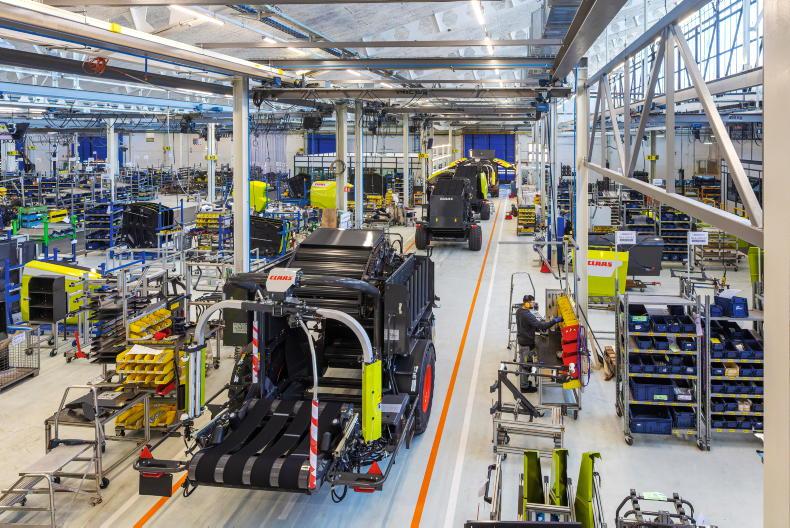
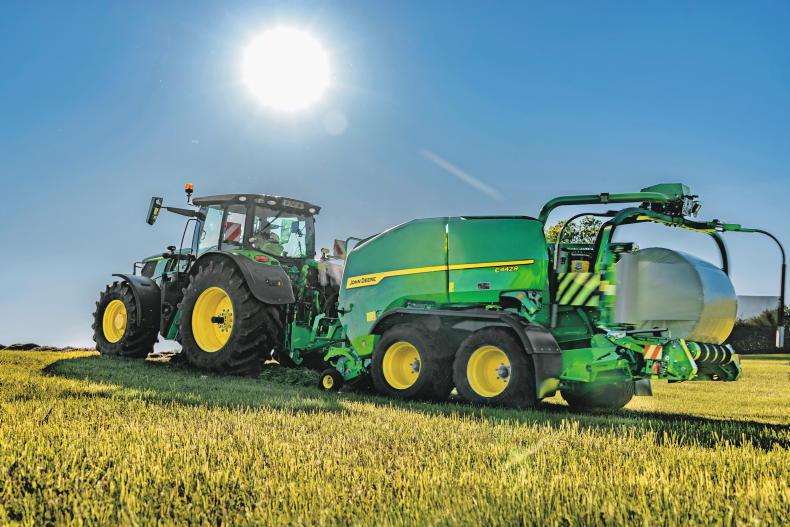
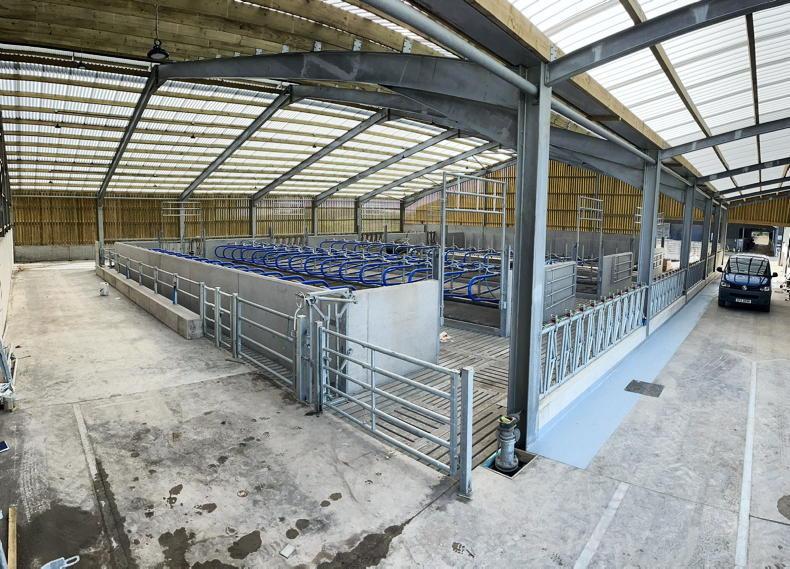
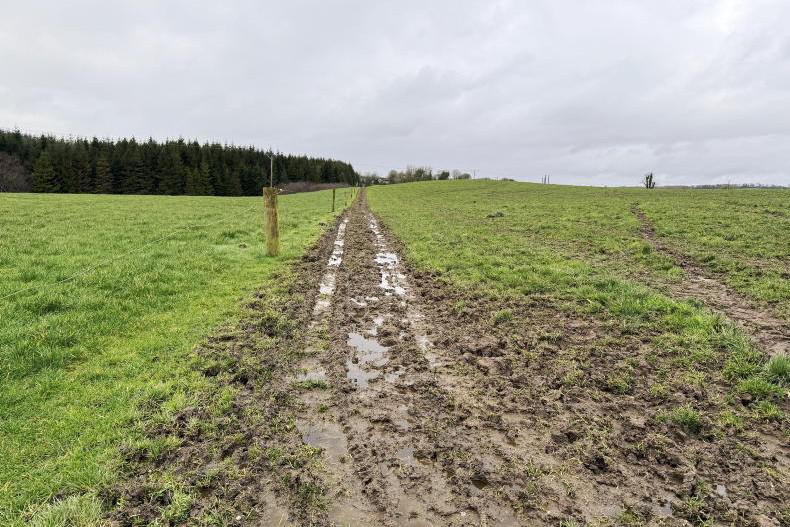
SHARING OPTIONS